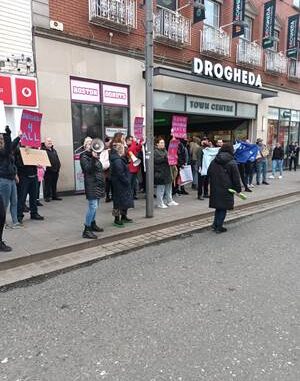
Far-right and fascist activity have not abated in Ireland over the past few months. Instead, it has intensified and widened. From Inch in Co. Clare to Portrush in Co. Antrim far-right forces increasingly feel confident enough to openly bring their hatred into our communities.
In the South, it is clear that the Gardaí [police] will not willingly take any action to stop these forces. Indeed, the Garda Commissioner, Drew Harris, has conceded that they will continue with a ‘softly-softly’ approach to the far-right and fascist mobs terrorising refugees and asylum seekers.
There is an unspoken alliance between the Irish state and the far-right. Both share the objective of using refugees and events like Sandwith Street, to serve their political agenda.
The far-right and fascists are now also increasingly turning their attacks on the LGBTQ+ community. Despite the ‘Pride-themed Garda cars and the carefully cultivated LGBTQ+ friendly image, the Gardaí do not and will not defend the LGBTQ+ community from this growing assault.
Instead, we are treated to the outrageous spectacle of Gardaí repeatedly facilitating homophobia, by allowing fascists to attack LGBTQ+ books in public libraries. This signals to that section of the population who remain hostile to the LGBTQ+ community, that the State is not prepared to protect LGBTQ+ people.
The State has also demonstrated clearly that it is prepared to tolerate the persistent harassment of library workers in their place of work, by known violent far-right activists. It has ignored calls from these workers’ trade unions to end this harassment.
So, the question remains: what happens if the fascists are permitted to continue mobilising, blockading, dominating the streets, attacking refugees, attacking librarians, harassing and threatening to kill socialist public representatives? Where does this end and who ends it?
What is to be done?
The State is not neutral in the face of a rising far-right and fascist wave. These movements have historically proven useful to the State in defending the capitalist order at a time of crisis. We are deep into a prolonged crisis of capitalism. We have seen the State in the South of Ireland turning its back on refugees, asylum seekers, and the LGBTQ+ community when challenged by a rampaging far-Right.
Nevertheless, the workers’ movement – trade unions, the socialist Left, and working-class communities – needs to continue its practice of mobilising and confronting them wherever they raise their heads. This has happened consistently over the past six months where counter-demonstrations have taken place in Drogheda, Dublin, Portrush, Inch, and many other locations.
But this is no longer enough. The workers’ movements must now consider more robust methods. Several years ago the fascist ‘Pegida’ movement attempted to mobilise in Dublin city centre but was challenged by the Left. They have not been seen since.
Confronting the violent far right and fascists, denying them access to public space, and defending those subject to their attacks, bring with it significant risks. The State will, without a shadow of a doubt, mount a determined campaign of repression against any attempt by the workers’ movement to smash the far right and fascism.
The likelihood that some far-right and fascist forces will secure even a modest electoral breakthrough at next year’s local elections cannot be ruled out. A platform in a council chamber for their agenda of hatred and division will make defeating them much harder.
Despite record economic growth and almost full employment in the South, living and working conditions continue to decline year-on-year, particularly for young workers. In parallel with facing-down the far right down on the streets we need a political programme focused on decent well-paid jobs, public housing, a universal health system, and an end to the cost of living crisis. A socialist programme of fighting for decent living and conditions for all, alongside a more robust approach from the workers’ movement on the streets, can forcefully cut across a rising far right.
Special financial appeal to all readers of socialistworld.net |
Support building alternative socialist media Socialistworld.net provides a unique analysis and perspective of world events. Socialistworld.net also plays a crucial role in building the struggle for socialism across all continents. Capitalism has failed! Assist us to build the fight-back and prepare for the stormy period of class struggles ahead. Please make a donation to help us reach more readers and to widen our socialist campaigning work across the world. |
Donate via Paypal |
| M | T | W | T | F | S | S |
|---|---|---|---|---|---|---|
| 1 | 2 | 3 | 4 | |||
| 5 | 6 | 7 | 8 | 9 | 10 | 11 |
| 12 | 13 | 14 | 15 | 16 | 17 | 18 |
| 19 | 20 | 21 | 22 | 23 | 24 | 25 |
| 26 | 27 | 28 | 29 | 30 | ||

